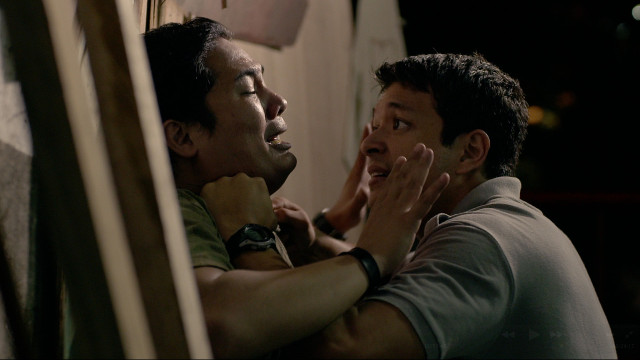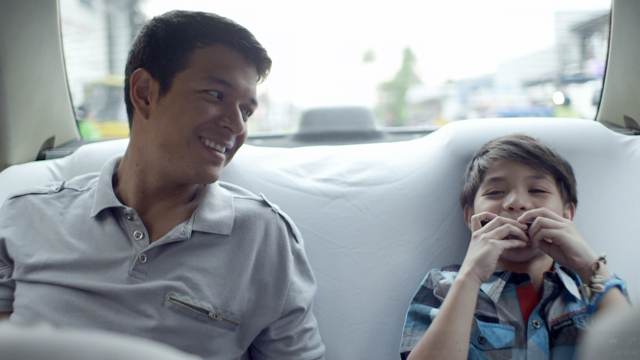SUMMARY
This is AI generated summarization, which may have errors. For context, always refer to the full article.

MANILA, Philippines – There are movies that hinge on their witty dialogue. But others let the action do the talking and fill the screen with loud explosions. Then, there are movies wherein not much is spoken, yet so much is said and so much happens. In the stillness among the actors as their scene lingers on, it’s their eyes that do the talking. Such a movie relies on the virtuosity of the actors, particularly the lead – as in the case of “Alagwa” (Breakaway) – and on his method, his gestures, movements, even his clothes.
Directed by Ian Loreños, “Alagwa” stars Jericho Rosales and Bugoy Cariño, together with Carmen Soo, Leo Martinez, Smokey Manaloto, John Manalo, Jeremiah Rosales, Iñaki Ting, Garry Lim, Nanette Inventor, Jamieson Lee, and EJ Caro.
“Alagwa” premiered on October 7, amid the screaming welcome and approval of Rosales’ fans. Here was their archetypal, dashing leading man in a different film. These same fans, nurtured by formulaic, derivative, and simply godawful Filipino movies since the late 1980s, were confronted by a rather striking drama that prompted their applause by the film’s end.
Urban legend
The movie is inspired by a so-called urban legend in Chinatown where Loreños grew up. “Alagwa” depicts the underworld of human trafficking in Asia.
In the story, Rosales plays Robert Lim, a widower caring for his only son Brian, played by Cariño. Living in Manila’s Chinatown, he makes a meager living as a salesman.
His son is abducted, and so begins a frantic search that leads Robert Lim to the labyrinth of Chinatown’s criminal underworld.
Like many independent films, “Alagwa” took its time to be screened in mainstream theaters. Along the way it won international awards. At the 2013 Newport Beach Film Festival, Rosales won Outstanding Achievement in Acting. At the 2013 Third World International Film Festival, “Alagwa” won Best Indie Film. At the 2013 Guam International Film Festival, it won Best Narrative Feature Film and Rosales won Best Actor. The film also received rave reviews at the Busan International Film Festival in Korea and at the 2013 Association of South East Asian Nations International Film Festival in Malaysia.
Locally, Rosales garnered the Best Actor award at the 2013 Gawad Urian and the 2013 Gawad Tanglaw. “Alagwa” also won Best Indie Film at the 2013 Philippine Movie Press Club Star Awards for Movies. But because of its late public showing this year, “Alagwa” will only be eligible to compete at the 2015 Oscars.
It’s undeniable – “Alagwa” is right at the cusp of what may well be a new golden age for Philippine cinema. The past months have seen the release of films that have garnered both critical acclaim and popular appeal, such as Erik Matti’s “On the Job” and Hannah Espia’s “Transit,” which the Film Academy of the Philippines has submitted to the Academy Awards for consideration in its Foreign-Language Film Category.
Then, there are the two other films competing in that category – “Metro Manila” by Englishman Sean Ellis and “Ilo-Ilo” by Singaporean Anthony Chen. Despite these being international productions, they can be argued as Filipino films – set in the Philippines, starring Filipino actors, featuring Filipino dialogue, and, most of all, telling Filipino stories. Not to forget are independently produced films such Ellen Ongkeko-Marfil’s “Boses” and Marie Jamora’s “Ang Nawawala.”
We compare “Alagwa” to others made in the Philippines not because there is a lower standard of excellence for local works (or indie films, for that matter). These are not just “good enough for a Filipino film”; they are good films, period. That they deserve mention means they passed the test of our limited attention. Rather, we compare Filipino films to each other because they share the same milieu.
As with “On the Job” and “Metro Manila” – both excellent films – the urban squalor of the capital city, as opposed to its already lost heritage, serves as the backdrop of “Alagwa” – or rather the background which by itself is a character in the film. Manila, in a way, is like the ruins of a post-apocalyptic or dystopian future, except that the Philippine capital is infinitely more frightening because it is real and it is now. “Alagwa” chooses to locate its protagonist in Manila’s Chinatown, contrasting it with scenes of Hong Kong. Sometimes though, these jumps to and from locations can be confusing as both Hong Kong and Chinatown are oriental in look.
Symmetry
As with “On the Job” and “Metro Manila,” “Alagwa” focuses on the gritty underworld of Manila. Most government authorities are portrayed as either corrupt, incompetent, or impotent. The protagonists don’t know who to trust.
Like “Metro Manila’s” narrative, “Alagwa’s“ is poetic and lyrical. In both movies, there is a symmetry toward the end that wraps up the story perfectly neat yet is refreshingly unpredictable. But unlike “Metro Manila,” “Alagwa” does not rely on a narrator to explain its story. In contrast, “Alagwa” ends with hardly a word said. If brevity and pithiness make for the best writing and if showing it instead of saying it makes for a better story, then Loreños’ restraint makes his script superb.
As with “On the Job,” which stars Piolo Pascual, “Alagwa” also casts a heartthrob hunk in the lead role. But unlike Pascual who, despite his competent acting in “On the Job,” is still shown in suspiciously gratuitous bare-chested scenes that display his six-pack abs, Rosales is allowed to successfully discard his typecast image and totally assume his character – that of a browbeaten and downtrodden widower. No shirtless scenes. No indulgent extreme closeups. No glint of boyish charm in his eyes. Instead, Loreños allows the camera to linger on Rosales, as a man slowly maddened by desperation and as a father nurturing his son with tough love.
There is genuine chemistry between Rosales and child actor Cariño. Rosales convincingly portrays a father struggling to keep his dignity in a world that constantly seeks to rob it from him. His character is a conflation of his father and his brother, whom he observes without their knowledge on how they care for their children.
Rosales also noted that the spare set in this independent production helped him assume the role. “The entire time I was like this [hunched up]. I was dirty all the time.”
By far the best comparison “Alagwa” enjoys is that with one of the greatest movies in world cinema – National Artist Ishmael Bernal’s 1982 classic “Himala,” starring the incomparable Nora Aunor. Not all actors can succeed with a script so sparse, wherein they are expected to say so much with so few words. Aunor did. So did Rosales, who was named Best Actor alongside Best Actress Aunor in the 2013 Urian. – Rappler.com
Here’s a trailer of ‘Alagwa’ from the YouTube of geekyjock9:
Add a comment
How does this make you feel?
There are no comments yet. Add your comment to start the conversation.